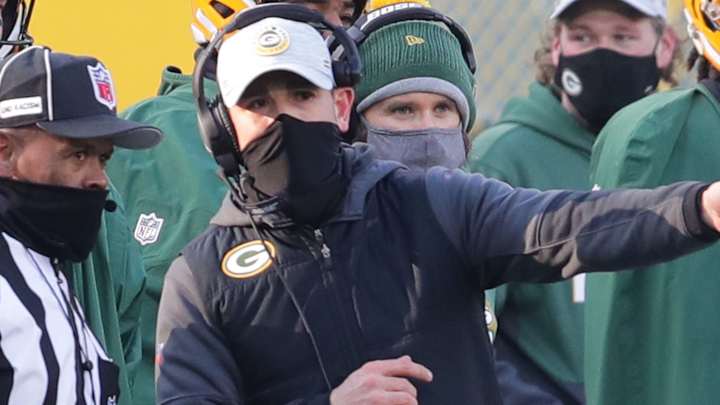Matt LaFleur's Misplaced Trust Could Cost the Packers More Than Just a Game

If you were anything like us, you may have spent the first few minutes after the Packers decided to kick a field goal on fourth-and-goal from the eight-yard line with 2:05 remaining in the NFC championship wondering whether there was something you might have missed.
The refinement of in-game decision-making analytics, which were some of the first widely utilized probability concepts of the modern analytics boon, are complex enough to throw the lay fan a curveball from time to time. Perhaps a field goal, which cut Green Bay’s deficit from eight to five, was the sensible maneuver.
Of course, that wasn’t the case. ESPN’s analytics department said the disparity was not large, but going for it on fourth down and subsequently trying for the two-point conversion would have given the Packers roughly a 0.5% greater chance of winning the game than kicking the field goal and taking the chance that they would get another possession and score a touchdown. EdjSports, another fine analytics outfit, said that the decision cost Green Bay 3% pre-snap in their Game Winning Chance model. And in fairness to LaFleur, at least one model showed the field goal as a slight edge, though it's unknown if that model took into account 1) Having Aaron Rodgers and 2) Giving the ball to Tom Brady.
Perhaps a big deal, perhaps not so.
GRAMLING: Conference Title Game Takeaways
If you were also like us, you have seen the hollow disappointment on the face of Aaron Rodgers as he congratulated Tom Brady and sent him off to the Super Bowl. Those eyes told a better story, perhaps of a man frustrated with the referees who flagged a questionable pass interference call that iced the game for Tampa Bay. Maybe of a quarterback who was flustered with some of the costly drops that took place throughout the afternoon. But it also could have been the face of Green Bay’s franchise wondering why his coach, in a moment where the numbers told him he could choose between one of the greatest singular talents in franchise history or a defense that had made several baffling coverage decisions (to put it nicely) already that night, Matt LaFleur chose the defense. A much bigger deal.
When asked directly about the decision after the game, Rodgers said: “It wasn’t my decision. Understand the thinking ... but, it wasn’t my decision.”
Rodgers later added that he did not run the ball on third-and-goal, when he appeared to have a lane, because he assumed he would have one more crack at the end zone.
That’s really the damning part of all this. While we tend to judge coaches now on how tightly they’ll follow the analytical blueprint laid out for them, LaFleur not only defied the (admittedly razor-thin) numbers and benched the most important weapon on the team but also entrusted defensive coordinator Mike Pettine with a situation that he had not demonstrated an ability to handle throughout the first half (Green Bay had a much better second half), and certainly not in other high-profile playoff situations like the loss to San Francisco last year. His reasoning, that Green Bay did not gain any yardage on downs one through three and that the Packers had three timeouts plus the two-minute warning, might be difficult to digest should this be one of Rodgers’s last great runs in Green Bay. It may always look like a coach holstering his weapon before a duel.
There were times throughout Rodgers’s career when his subtle postgame press conference theatrics—a terse comment directed at a coach here, a cross-body jab there—were not constructive or overly helpful. Former coaches who knew the situation in Green Bay have talked often about the challenge that comes along with managing Rodgers. He demands the kind of maniacal competitiveness and preparation that he gives the franchise each week, which is not inherently built into every person. But the mess Green Bay was left with on Sunday, with Rodgers questioning his near future and basically wondering aloud if he would be back in Wisconsin next year, was earned.
Regardless of what the numbers say, there seemed to be palpable pain and resentment for having the ball taken out of his hands. The long-term damage will be more difficult to quantify.

Conor Orr is a senior writer for Sports Illustrated, where he covers the NFL and cohosts the MMQB Podcast. Orr has been covering the NFL for more than a decade and is a member of the Pro Football Writers of America. His work has been published in The Best American Sports Writing book series and he previously worked for The Newark Star-Ledger and NFL Media. Orr is an avid runner and youth sports coach who lives in New Jersey with his wife, two children and a loving terrier named Ernie.
Follow ConorOrr